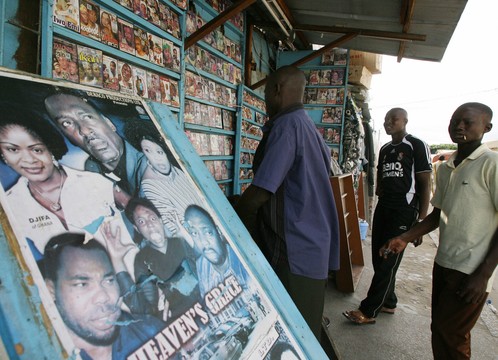
According to urban mythology, Nollywood, as the Nigerianfilm industry has been dubbed, owes its birth partly to an excess of blankvideotapes that flooded the Lagosstreets in 1992. The source: a singlebusinessman. The myth goes on to claimthat these tapes, which were likely to be discarded, would become the manger inwhich the Nollywood wasborn. This narrative coincides withthe release of “Living in Bondage,” Nollywood’s version of Hollywood’s “Birth of a Nation.”
In reality, though, the Nigerian film industry – a $250million operation that employs thousands – owes its popularity and success toaffordable digital technology, an entrepreneurial spirit and the desire of Nigeriansto tell their story with a uniquely African flare.
It is that compulsion to tell one’s story that hasepitomized Nollywood’s meteoric rise to global notoriety. Following in the storytelling footsteps ofthe country’s literary giants like Wole Soyinka, Chinua Achebe, ChristopherOkigbo and Ben Okri, the industry’s producers are currently producing over 500movies a year, with a uniquely Nigerian touch.
But despite the impressive film output, one scholar arguesthat Nollywood has not received the attention it deserves. This year at TexasSouthern University, Houston’s,29th annual Intercultural Communications Conference, Nigerian-bornC. Chris Ulasi, an associate professor of communication, gave a lecture focusedon film production, representation and nation building.
“[My paper] tried to highlight the point that Nigeria hasmade a significant achievement in the area of cultural production, specificallyfilm, and this happened out the sheer doggedness of the people in the industryat a time when the country was in an economic mess and people were afraid ofgoing out to movies because of crime,” Ulasi said. “The only alternative was tosit at home and watch videocassettes. These young entrepreneurs just like their counterparts in Hollywood atthe turn of the century did by exploiting the dime theatres and vaudeville, sothey started using digital cameras to produce movies and before you know ittheir output is in the thousands a year.”
Ulasi illustrated Nollywood’s emergence and vitality as thethird biggest player in the global movie business only after India’s Bollywood and Hollywood.
“It is vital because it is a major cultural industry and thedebate over a people’s ability to represent their own essentialism, history…[The ability] to tell their own stories is very important,” Ulasi said. “Nollywoodseems to have achieved the ability to tell not just the Nigerian or the Africanstory but a story that has reverberated throughout the continent and evenbeyond to the (African) Diaspora.”
He said that perhaps because Nollywood films do not possessthe best technical qualities, especially when compared to Hollywood standards, Nollywoodremains an underreported story in a media landscape saturated with negativestories from Africa. The importance of Nollywood, Ulasi said,cannot be overstated.
“[First] on a cultural level, secondly on a economic leveland on the level of representation, the images that circulate around the worldand circulate the meaning from which we ascribe certain perceptions or ideasabout who we are, our place in the world and how other people view us,” Ulasi said.
Today, Nollywood’s popularity and impact in both the digitalstorytelling world and beyond has other storytellers, armed with microphone andcamera, eager to narrate this bourgeoning industry’s story.
“This is Nollywood”is one such attempt by a non-Nigerian filmmaker who embarked on amission to tell the industry’s story. Directed by Franco Sacchi of the Centerof Digital Imaging Arts at Boston University,“This is Nollywood” is an insight into the challenges, complexities and triumphof the industry. The Nigerian movieindustry’s evolving story is told vicariously through renowned director, BondEneruwa’s attempt to produce a feature film in 9 days with just $20,000. The documentary has already been officiallyselected for a handful of film festivals including London’sRaindance Film Festival in Londonand the Rhode Island Film Festival, among others.
When Sacchi first heard of Nigerian directors making featurefilms with shoestring budgets, he found it irresistible.
“Here was not only a rare positive story about Africa, but one that embodied the egalitarian promise ofdigital technology—anybody can make a movie. And Nollywood was a virtual unknown,” Sacchi said in his director’sstatement.
Sacchi’s “This is Nollywood” recently won the Audience Awardat the Abuja International Film Festival.
About Kangsen Feka Wakai
Kangsen Feka Wakai is a Houston based poet and writer. He is from Cameroon.
- Web |
- More Posts(2)







